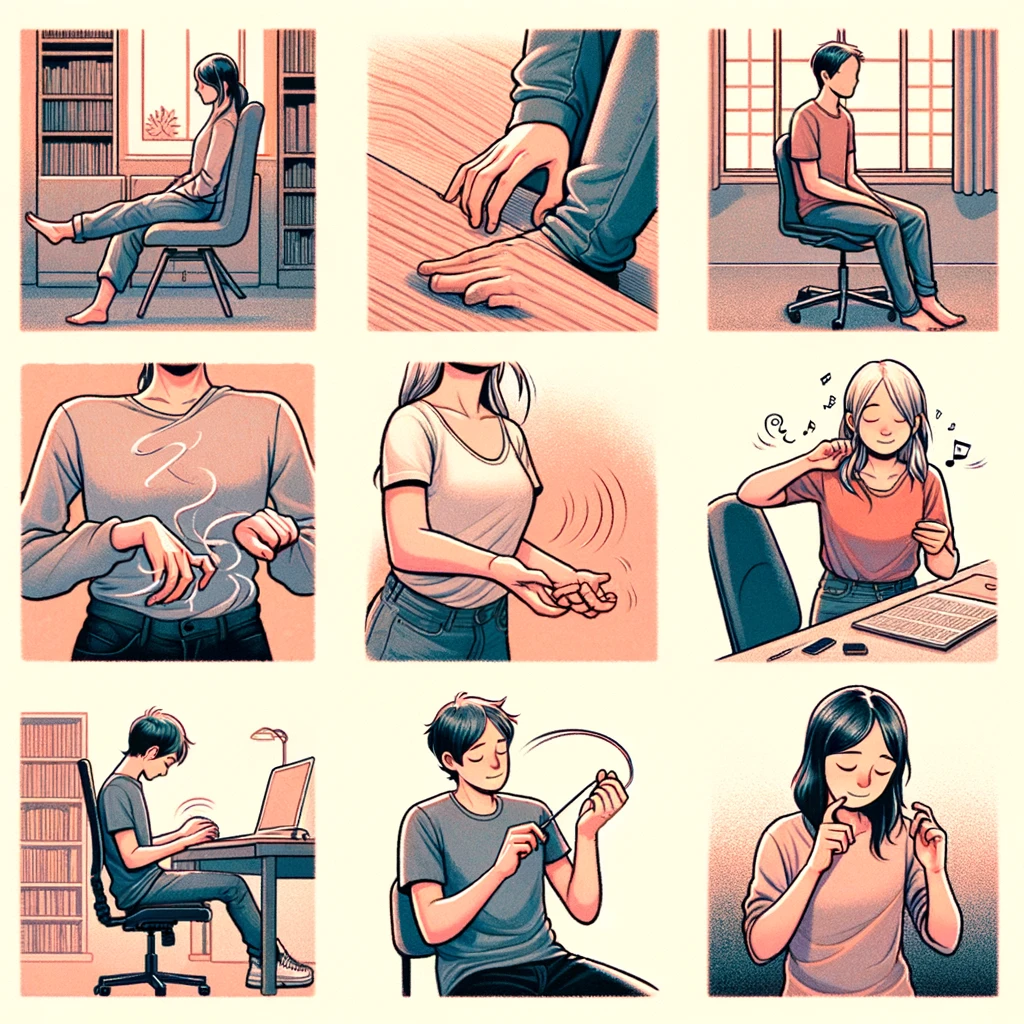🌟🌟 Understanding ADHD in Women: A Comprehensive Guide with Insights from Research 🌟Kristen McClure 🌟
ADHD in Women

ADHD (Attention Deficit Hyperactivity Disorder) presents uniquely in women, leading to underdiagnosis and misdiagnosis. This comprehensive guide covers various aspects of ADHD (Attention Deficit Hyperactivity Disorder) in women, including hormonal impacts, challenges in diagnosis, emotional regulation, and more. It also provides practical resources and checklists for those seeking understanding and support.
🔍 Introduction to ADHD in Women
Many women go undiagnosed or misdiagnosed with ADHD because symptoms can present differently in females. Recognizing these symptoms is crucial, especially since life changes like hormonal fluctuations during puberty, pregnancy, and menopause can amplify or modify ADHD symptoms.
🌀 ADHD Women and Hormones
Hormonal fluctuations significantly impact ADHD symptoms in women:
- Puberty: Hormonal changes can intensify symptoms, leading to an initial diagnosis. Girls have fluctuating symptoms during their period. Estrogen influences the availability of dopamine, which has a crucial role in how adhd brains function. Specifically, all aspects of how emotions are felt and regulated, attention concentration, and the ability to plan, prioritize, and remember may be impacted.
- Pregnancy: Hormone level fluctuations can exacerbate or alleviate symptoms.
- Menopause: A decline in estrogen can worsen symptoms, sometimes leading to first-time diagnoses.
Understanding these hormonal influences is vital for managing ADHD effectively throughout different life stages.
🔎 ADHD Women, Diagnosis, and Challenges
ADHD in women is often underdiagnosed due to symptoms like inattentiveness, which are less visible than hyperactivity. This leads to many women being misdiagnosed with mood disorders such as anxiety, depression, Borderline Personality Disorder (BPD), or Bipolar Disorder. Recognizing the challenges in diagnosis is crucial for receiving appropriate treatment and support.
Call for More Research: There is a significant need for more research into ADHD in women, including trans and nonbinary individuals, to understand better and address the unique challenges they face. Advocacy for this research is essential to improve diagnosis, treatment, and support for all individuals with ADHD.
So, what should you do if you think you have ADHD? I often tell my clients to start with this checklist and bring it to their primary care physician as a starting point. From there, a referral can be made if your doctor thinks you might need more treatment or medication.
📝📝 Do I Have ADHD? A Self-Assessment Checklist for Identifying Symptoms
This checklist is based on the Adult ADHD Self-Report Scale (ASRS-v1.1). It's designed to help you reflect on your behaviors and tendencies that may be associated with ADHD. Please note that only a licensed mental health professional can diagnose ADHD. For each question, check the box if the statement applies to you often or very often:Note: This checklist is for self-reflection purposes only and is not a substitute for professional medical advice or diagnosis. If many of these behaviors are frequently present and affect your daily functioning, consider consulting with a healthcare provider or mental health professional for a comprehensive evaluation. Adult ADHD Self-Report Scale (ASRS-v1.1) Symptom Checklist questions Learn about scoring here
- 🗹 Trouble Completing Projects: How often do you have trouble wrapping up the final details of a project, once the challenging parts are done?
- 🗹 Dependence on Others: How often do you depend on others to keep your life in order?
- 🗹 Difficulty Concentrating: How often do you have difficulty concentrating on what people say to you, even when they are speaking directly?
- 🗹 Procrastination: How often do you put off things until the last minute?
- 🗹 Avoiding Problem-Solving: When you have a problem that requires thought, how often do you avoid or delay getting started?
- 🗹 Organizational Challenges: How often do you have difficulty getting things in order when you have to do a task that requires organization?
- 🗹 Memory Issues: How often do you have problems remembering appointments or obligations?
- 🗹 Fidgeting or Squirming: How often do you fidget or squirm when you have to sit down for a long time?
- 🗹 Feeling Overly Active: How often do you feel overly active and compelled to do things, like a motor is driving you?
- 🗹 Careless Mistakes: How often do you make careless mistakes when you have to work on a boring or difficult project?
- 🗹 Attention Drifting: How often do you have difficulty keeping your attention when doing boring or repetitive work?
- 🗹 Misplacing Items: How often do you misplace or have difficulty finding things at home or work?
- 🗹 Distractibility: How often are you distracted by activity or noise around you?
- 🗹 Leaving Your Seat: How often do you leave your seat in meetings or other situations where you are expected to remain seated?
- 🗹 Restlessness: How often do you feel restless or fidgety?
- 🗹 Difficulty Relaxing: How often do you have difficulty unwinding and relaxing when you have time to yourself?
- 🗹 Talking Too Much: How often do you find yourself talking too much in social situations?
- 🗹 Interrupting Conversations: How often do you find yourself finishing the sentences of others before they can finish them themselves?
- 🗹 Difficulty Waiting Turn: How often do you have difficulty waiting your turn in situations where turn-taking is required?
- 🗹 Interrupting Others: How often do you interrupt others when they are busy?
🔍 Specific Symptom Types in Women and Their Impact on Diagnosis
ADHD symptoms can vary based on the type of ADHD:
- Inattentive Type: Women with this type may struggle with staying focused, organizing tasks, following through on projects, and remembering details. They might often be perceived as daydreamers or forgetful.
- Hyperactive/Impulsive Type: Women with this type of ADHD have symptoms that include fidgeting, restlessness, interrupting others, and difficulty waiting their turn.
- Combined Type: This type includes a mix of inattentive and hyperactive/impulsive symptoms.
Depression and anxiety are common comorbidities with all subtypes of ADHD for women. Medications, should you opt for them, will vary depending on these co-occurring conditions and the type of ADHD you present with, among other things.
🎭🎭 ADHD Women and Masking Behaviors
Women with ADHD often develop coping mechanisms known as "masking" to fit societal expectations. This includes suppressing symptoms, striving for perfectionism, and engaging in people-pleasing behaviors that develop in girlhood. While these strategies may help navigate daily life, they often lead to significant emotional strain and burnout when girls grow into adults. Many doctors are uneducated about masking and may think women don't have adhd because they can't see through masking behaviors.
⏳ ⏳ ADHD Women and Late Diagnosis: Understanding the Role of History
Receiving an ADHD diagnosis later in life can be both a relief and a source of grief. Many women experienced a sense of loss for their unknown struggles and missed opportunities. Processing these emotions and working towards self-acceptance is crucial in healing as adults.
🌟 High-Functioning ADHD Women: Understanding Behavioral Patterns
"High-functioning" ADHD refers to individuals who manage their symptoms well enough to meet daily responsibilities but still face internal struggles. It's important to recognize that being high-functioning does not negate the challenges or the need for support.
💔 ADHD Women and Emotional Regulation: Understanding Mood Swings
Emotional dysregulation is a critical yet often neglected aspect of ADHD. Women with ADHD may experience intense emotions, have difficulty managing them, and struggle to calm down after being upset. Addressing emotional regulation is essential for comprehensive ADHD management and different medications are available. It is crucial that women find doctors who are well-versed in the fact that ADHD does impact emotions, as it's not currently included in treatment manuals, and some doctors are not educated about this.
💔 ADHD Women, Rejection Sensitive Dysphoria (RSD), and Emotional Regulation
Rejection Sensitive Dysphoria (RSD) involves extreme emotional sensitivity to perceived or actual rejection or criticism. For women with ADHD, RSD can significantly impact self-esteem and relationships. Recognizing RSD as part of the ADHD experience is essential for understanding and managing emotional responses.
🌐 Challenges Faced by Women with AuDHD
Women with both Autism and ADHD (AuDHD) face unique challenges, including heightened sensory sensitivities and difficulties with social relationships. This dual diagnosis can complicate treatment and support, necessitating a nuanced understanding.
🌍 Impact of Challenges on Day-to-Day Life of Adults
ADHD can affect many aspects of daily life:
- Work: Difficulties with time management, organization, communication, self-care, task completion, and meeting deadlines can impact job performance.
- Social Relationships: Challenges in maintaining friendships or romantic relationships due to impulsivity, forgetfulness, or emotional dysregulation.
- Financial Management: Impulsivity and disorganization can lead to economic issues, such as overspending or difficulty managing bills.
Expanding on these daily life impacts with relatable examples can help readers understand the practical challenges of living with ADHD.
🏳️🌈 🏳️🌈 Inclusivity, Diversity, and Gender Differences in ADHD
Gender Spectrum: ADHD affects individuals across the gender spectrum, including trans women and nonbinary people. Including a discussion on these populations highlights their unique challenges and emphasizes the need for inclusive support and research. It is essential to address the lack of research in this area and advocate for more studies to better understand and support all individuals with ADHD.
🛠️ Challenges Faced by Unsupported ADHD Women
Women with ADHD often face significant struggles if unsupported, including:
- Anxiety and Depression: The constant struggle to manage symptoms can lead to feelings of anxiety and depression.
- Imposter Syndrome: Many women with ADHD feel like they are constantly "faking it" and fear being exposed as incompetent.
- Burnout: The effort of masking and overcompensating for ADHD symptoms can lead to severe burnout.
- Physical Illness: ADHD women have a variety of stress-related physical illnesses such as migraine and fibromyalgia
- Relationship Issues: Emotional dysregulation and RSD can cause challenges in maintaining healthy relationships.
- Eating Disorders: Impulse control issues and emotional dysregulation may contribute to disordered eating patterns, such as binge eating, emotional eating, or restrictive eating, often exacerbated by stress or anxiety.
- Addictive Behaviors: A tendency to develop addictive behaviors, such as reliance on sugar, caffeine, or alcohol, as a form of self-medication for managing ADHD symptoms.
- Sleep Disorders: Chronic difficulties with sleep, including insomnia, restless sleep, or irregular sleep patterns due to hyperactivity or racing thoughts.
💡 💡 How Can I Get Diagnosed with ADHD by Consulting a Doctor?
If you suspect you have ADHD, seeking a professional diagnosis is the first step toward understanding and managing your symptoms. Professionals who can diagnose ADHD include:
- LCSW (Licensed Clinical Social Worker): Trained in mental health assessment and capable of diagnosing ADHD.
- Clinical Psychologists (Ph.D.): Experts in assessing and diagnosing various psychological conditions.
- General Practitioners: Can provide initial assessments and referrals to specialists.
- Psychiatrists: Medical doctors specializing in mental health, who can diagnose ADHD and prescribe medications.
- Licensed Counselors: Qualified to diagnose and provide therapeutic treatments for ADHD.
Supporting ADHD Girls 🌟: Guidance for Parents
Stephen Hinshaw, a renowned expert in ADHD, has highlighted that adhd girls often exhibit behaviors that aren't as overtly disruptive but can cause them significant trouble in their academic and social lives. They often struggle with anxiety and depression, friendship issues including bullying, and this can become a bigger problem. Things like inattention and disorganization can leave them behind academically as well. Early treatment and the right support are key. Additionally, we know that children who are taught about and learn to embrace their neurodivergence do much better. It's also important to know that girls with mixed ADHD are especially at risk for trouble with substance abuse, self-harm, and sexual acting out, which makes understanding and addressing their specific needs even more critical. 🚸📚
Therapy for Women with ADHD: Enhancing Mental Health 🌟
Effective treatment for women with ADHD must consider the impact of hormones during all points in a woman's life cycle: her period, pregnancy, perimenopause, and menopause. At each point, hormone levels can either improve or exacerbate symptoms related to executive functioning. A strengths-based and neurodivergent approach to therapy is ideal.
Support groups, advocacy, and a strong foundation in self-awareness and self-care are crucial for navigating challenges in school, with friends, and in broader social contexts. Additionally, it must consider what we are rapidly learning about neurodivergence and how the expectation to make adjustments to live neurotypically has caused illness and burnout. 💪🧠🌸
🌟 Wrapping it Up: Adhd Symptoms Diagnosis and Treatment in Women
Understanding ADHD in women requires a nuanced approach that considers unique symptoms, hormonal influences, and the challenges faced across different life stages. From recognizing emotional regulation issues and RSD to navigating late diagnosis and high-functioning presentations, women with ADHD can thrive with the right resources and understanding; women with ADHD can navigate their journey and thrive, embracing their strengths and managing their challenges.
Check out Attitude's information
Explore Additional ADHD Resources on My Page
- Anxiety and Depression
- Issues with diet and exercise
- Issues with procrastination ADHD MEDICATION
- Learn about why medication helps
- Learn about adhd and hyperfocus Learn about ADHD and the kitchen
- ADHD and perimenopause
- Learn about Adhd and music
- Learn about Adhd and shopping
- Learn about Adhd and listening
- Caffeine and adhd
- Social anxiety and adhd
- Boundaries and adhd
- Self compassion and adhd
- hyperfocus
References to Studies on ADHD in Women
Fuller-Thompson, Esme, et al. The Dark Side of ADHD: Factors Associated With Suicide Attempts Among Those With ADHD in a National Representative Canadian Sample. Archives of Suicide Research (Dec. 2020)





